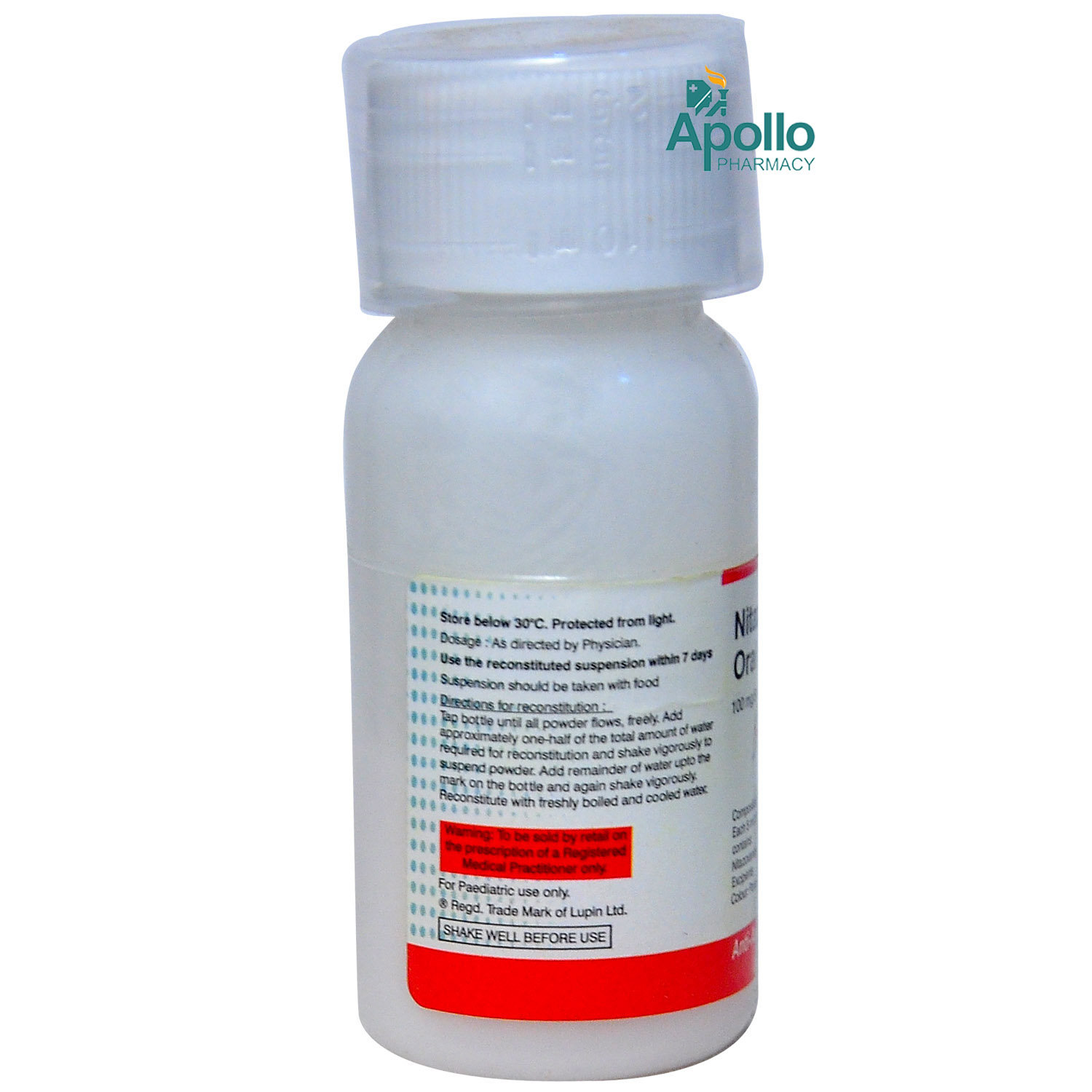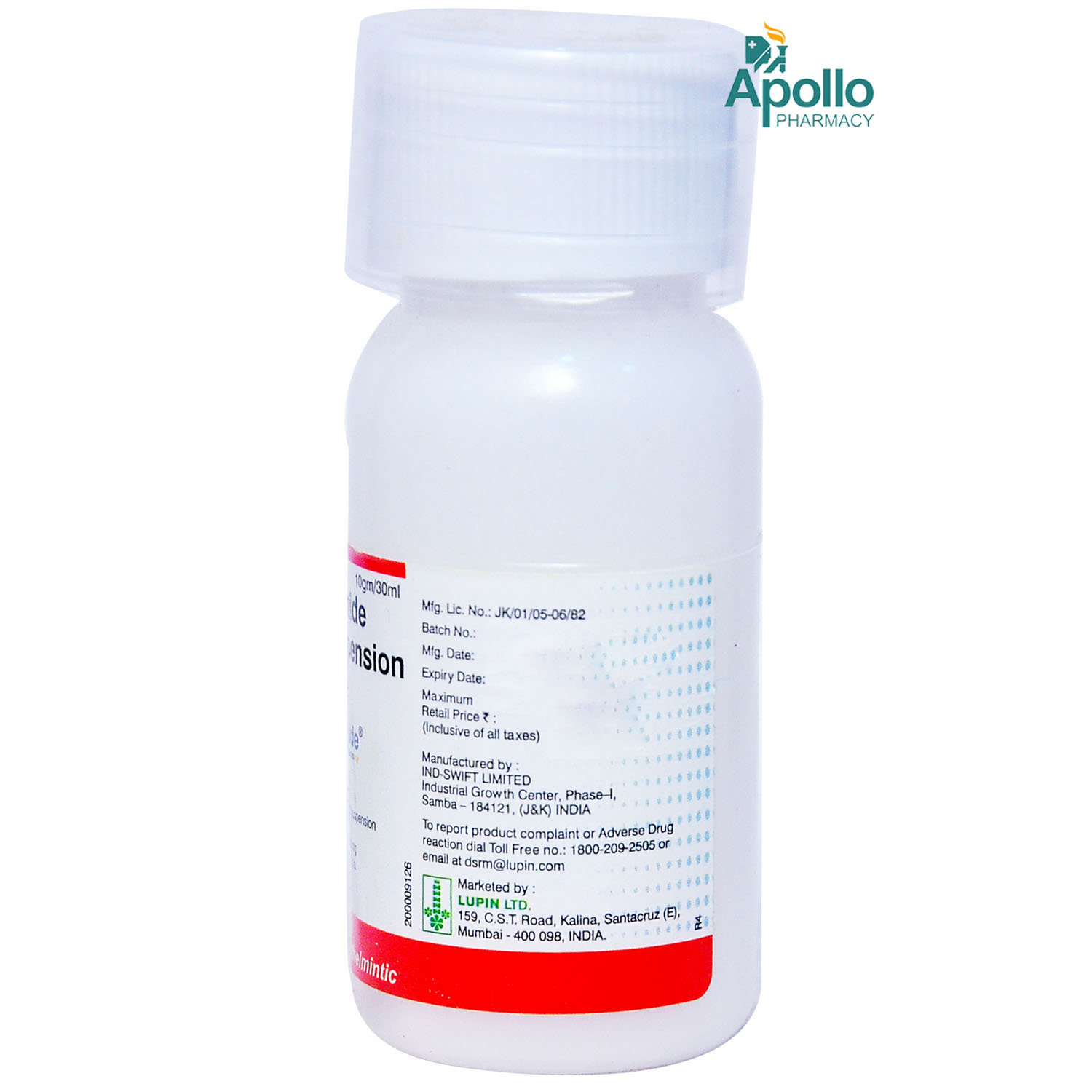Nizonide Oral Suspension 30 ml
MRP ₹41.5
(Inclusive of all Taxes)
₹6.2 Cashback (15%)
Provide Delivery Location

secured payment

india's most trusted pharmacy

genuine products
Composition :
Manufacturer/Marketer :
Consume Type :
Expires on or after :
Return Policy :
About Nizonide Oral Suspension
Nizonide Oral Suspension belongs to the class of 'antiprotozoal and antiviral' drugs, primarily used to treat diarrhoea caused by parasite infections of the intestines (Cryptosporidium parvum and Giardia lamblia). Nizonide Oral Suspension also treats protozoa infections caused by single-cell parasites that live in moist places like lakes, streams, and soil. Diarrhoea is a condition that causes the frequent passing of loose or watery stools.
Nizonide Oral Suspension contains Nitazoxanide, which belongs to the class of drugs known as thiazolides. Nitazoxanide is a broad-spectrum anti-parasitic medication. It inhibits the production of chemical substances required for energy metabolism and growth of protozoa, helminths (worm-like parasites), anaerobic (microbes that survive without oxygen), and microaerophilic (requires little oxygen to survive) and viruses. Nitazoxanide is effective in the treatment of gastrointestinal infections.
Please take Nizonide Oral Suspension in the dose and duration prescribed by your doctor based on your medical condition. Nizonide Oral Suspension is generally safe to use. However, some may experience side effects like nausea, vomiting, stomach pain, fever, hair loss, dizziness, giddiness, and headache. Most of these side effects of Nizonide Oral Suspension do not require medical attention and gradually resolve over time. If these side effects persist longer, please consult your doctor.
Inform your doctor if you have any liver or kidney diseases asthma, and weakened immune system before starting Nizonide Oral Suspension. If you are allergic to Nizonide Oral Suspension or any other medicines, please tell your doctor. Do not suddenly stop this medicine to avoid unpleasant side effects and sudden withdrawal symptoms. Intake of probiotics, prebiotics, and plenty of fluids is recommended if you are suffering from diarrhoea. Pregnant and breastfeeding women should use Nizonide Oral Suspension with proper consultation and caution. Do not drive or operate heavy machinery after taking Nizonide Oral Suspension as it may cause dizziness.
Uses of Nizonide Oral Suspension

Have a query?
Directions for Use
Key Benefits
Nizonide Oral Suspension contains Nitazoxanide, which belongs to the class of drugs known as thiazolides. Nitazoxanide is a broad-spectrum anti-parasitic, antiprotozoal, and antiviral medication, primarily used to treat diarrhoea. It inhibits the production of chemical substances required for energy metabolism and growth of protozoa, helminths (worm-like parasites), anaerobic (microbes that survive without oxygen), and microaerophilic (requires little oxygen to survive) and viruses. Nitazoxanide is effective in the treatment of gastrointestinal parasite infections, including Cryptosporidium parvum and Giardia lamblia.
Storage
- Drink water or other clear fluids.
- To prevent worsening of pain, limit intake of tea, coffee, or alcohol.
- Include bland foods like rice, toast, crackers, and rice in your diet.
- Avoid lying down immediately after eating as it may cause indigestion or heartburn.
- Avoid acidic and spicy food as it may cause indigestion.
- Hydrate your body: Drink enough water to prevent dehydration and headaches.
- Calm Your Mind: Deep breathing and meditation can help you relax and relieve stress.
- Rest and Recharge: Sleep for 7-8 hours to reduce headache triggers.
- Take rest: lie down in a quiet, dark environment.
- Cold or warm compresses can help reduce tension.
- Stay Upright: Maintain good posture to keep symptoms from getting worse.
- To treat headaches naturally, try acupuncture or massage therapy.
- Over-the-counter pain relievers include acetaminophen and ibuprofen.
- Prescription Assistance: Speak with your doctor about more substantial drug alternatives.
- Severe Headaches: Seek emergency medical assistance for sudden, severe headaches.
- Frequent Headaches: If you get reoccurring headaches, consult your doctor.
- Headaches with Symptoms: Seek medical attention if your headaches include fever, disorientation, or weakness.
- Inform your doctor about the nausea and discuss possible alternatives to the medication or adjustments to the dosage.
- Divide your daily food intake into smaller, more frequent meals to reduce nausea.
- Opt for bland, easily digestible foods like crackers, toast, plain rice, bananas, and applesauce.
- Avoid certain foods that can trigger nausea, such as fatty, greasy, spicy, and smelly foods.
- Drink plenty of fluids, such as water, clear broth, or electrolyte-rich beverages like coconut water or sports drinks.
- Use ginger (tea, ale, or candies) to help relieve nausea.
- Get adequate rest and also avoid strenuous activities that can worsen nausea.
- Talk to your doctor about taking anti-nausea medication if your nausea is severe.
- Record when your nausea occurs, what triggers it, and what provides relief to help you identify patterns and manage your symptoms more effectively.
- Preventing Vomiting (Before it Happens)
- Take medication exactly as prescribed by your doctor. This can help minimize side effects, including vomiting.
- Having a small meal before taking your medication can help reduce nausea and vomiting.
- Talk to your doctor about taking anti-nausea medication along with your prescribed medication.
- Managing Vomiting (If it Happens)
- Try taking ginger in the form of tea, ale, or candy to help alleviate nausea and vomiting.
- What to Do if Vomiting Persists
- Consult your doctor if vomiting continues or worsens, consult the doctor for guidance on adjusting your medication or additional treatment.
- Prepare for a restful night's sleep: Develop a calming pre-sleep routine, like reading or meditation, to help your body relax and prepare for sleep.
- Create a sleep-conducive Environment: Make bedroom a sleep haven by ensuring it is quiet, dark and calm.
- Follow a Sleep Schedule: Go to bed and get up at the same time every day to help regulate your body's internal clock and increase sleep quality.
- Try relaxing techniques like deep breathing, mindfulness meditation and any others.
- Limit stimulating activities before bedtime: Avoid stimulating activities before bedtime to improve sleep quality.
- Monitor Progress: Keep track of your sleep patterns to identify areas for improvement.
- Consult a doctor if needed: If these steps don't improve your sleep, consult a doctor for further guidance and therapy.
- Painful urination can be reduced by drinking lots of water.
- Don't hold urine, as it can worsen the pain during urination.
- Try taking probiotics and eating garlic, which can help reduce painful urination.
- Sleep well and give enough rest to your body.
- Take a balanced diet and avoid bladder-irritating foods.
- Quit smoking and intake of alcohol.
- Practice yoga and meditation to improve inner strength and stay healthy.
- Take medications with food (if recommended): It can help prevent stomach distress and indigestion.
- Eat smaller, more frequent meals: Divide daily food intake into smaller, more frequent meals to ease digestion.
- Avoid trigger foods: Identify and avoid foods that trigger indigestion, such as spicy, fatty, or acidic foods.
- Stay upright after eating: Sit or stand upright for at least 1-2 hours after eating to prevent stomach acid from flowing into the oesophagus.
- Avoid carbonated drinks: Avoid drinking carbonated beverages, such as soda or beer, which can worsen indigestion.
- Manage stress: To alleviate indigestion, engage in stress-reducing activities like deep breathing exercises or meditation.
- Consult a doctor if needed: If indigestion worsens or persists, consult a healthcare professional to adjust the medication regimen or explore alternative treatments.
Drug Warnings
Inform your doctor if you have any liver or kidney diseases, asthma, diabetes, and a weakened immune system before starting Nizonide Oral Suspension. If you are allergic to Nizonide Oral Suspension or any other medicines, please tell your doctor. Do not take Nizonide Oral Suspension on your own since it may lead to antibiotic-resistance failing the antibiotics to act against specific infections. Do not suddenly stop this medicine to avoid unpleasant side effects and sudden withdrawal symptoms. Please consult your doctor if you are planning to become pregnant or already pregnant before starting Nizonide Oral Suspension. Do not drive or operate heavy machinery after taking Nizonide Oral Suspension as it may cause dizziness. Nizonide Oral Suspension is not recommended for children less than one year of age.
Drug-Drug Interactions
Drug-Drug Interactions
Login/Sign Up
Drug-Food Interactions
Drug-Food Interactions
Login/Sign Up
Diet & Lifestyle Advise
- Antibiotics can alter the useful bacteria in the stomach. Therefore, you are advised to take foods rich in probiotics such as yoghurt/curd, kefir, sauerkraut, tempeh, kimchi, miso, kombucha, buttermilk, natto, and cheese.
- Eat fibre rich food like whole grains, beans, lentils, berries, broccoli, peas, and bananas.
- Avoid foods rich in calcium, grapefruit, and grapefruit juice as they might hinder antibiotic's absorption.
- If you have diarrhoea try to drink appropriate amounts of fluids to avoid dehydration.
- If you have minor diarrhoea (less than four stools daily) drinking caffeine-free soft drinks, juices or sport rehydration drinks can be sufficient.
- If the diarrhoea is more severe, specially formulated rehydration drinks should be taken.
- Avoid alcoholic beverages with Nizonide Oral Suspension as it can make you dehydrated and may affect your sleep. This can make it harder for your body to aid the Nizonide Oral Suspension in fighting off infections.
Habit Forming
Therapeutic Class
Alcohol
Safe if prescribed
Alcohol consumption may worsen the side effects of Nizonide Oral Suspension like dizziness. It is better to avoid alcohol while you are being treated with Nizonide Oral Suspension.
Pregnancy
Consult your doctor
There is limited data on how the Nizonide Oral Suspension affects pregnancy. Nizonide Oral Suspension should be used during pregnancy only if the benefit outweighs the risk. Please consult your doctor if you are planning to become pregnant or already pregnant before starting Nizonide Oral Suspension.
Breast Feeding
Consult your doctor
Nizonide Oral Suspension is excreted into the breast milk while used by a breastfeeding mother. Please consult your doctor before taking Nizonide Oral Suspension if you are breastfeeding.
Driving
Safe if prescribed
Do not drive or operate machinery if you experience any dizziness while using Nizonide Oral Suspension.
Liver
Consult your doctor
Please take Nizonide Oral Suspension with caution and doctor's advice if you have a history of liver diseases/conditions.
Kidney
Consult your doctor
Please take Nizonide Oral Suspension with caution and doctor's advice if you have a history of kidney diseases/conditions.
Children
Safe if prescribed
Nizonide Oral Suspension is not recommended for children less than one year of age.
FAQs
Nizonide Oral Suspension contains Nitazoxanide. It is an antiprotozoal and antiviral drug that inhibits the production of chemical substances required for energy metabolism and growth of parasites, thus treating diarrhoea.
Please let your doctor know if you have a history of allergic reactions to medicines, liver or kidney diseases, asthma, weakened immune system, and diabetes before starting Nizonide Oral Suspension.
If you miss a dose, take it as soon as you remember. However, if it is time for the next scheduled dose, skip the missed dose and follow your usual dosage.
Do not stop using Nizonide Oral Suspension even if you feel better until the doctor's advised course is finished. Your symptoms may improve, but the infection may not be cured completely.
Country of origin
Manufacturer/Marketer address
Disclaimer
Author Details
We provide you with authentic, trustworthy and relevant information










